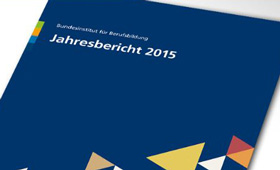Structuring vocational education in a future-oriented way
2015 BIBB Annual Report published
30/2016 | Bonn, 23.06.2016

The integration of refugees into training and work and the changes in occupational requirements brought about by digitalisation are currently central tasks facing vocational education and training in Germany. “German VET is fundamentally well structured enough in order to face up to the impending challenges. Nevertheless, existing instruments need to be scrutinised and initial and continuing vocational education and training must be further developed and structured in a future-oriented way,” stresses Professor Hubert Esser, President of the Federal Institute for Vocational Education and Training. Data, analyses and programmes from BIBB provide important foundations for this purpose, as detailed in the 2015 BIBB Annual Report.
“It remains important to support companies with training, to continue to develop quality in vocational education and training and to open up VET by permitting it to take account of different types of prior learning,” Professor Esser continued. The topics addressed by the 2015 BIBB Annual Report include how digitalisation is changing the work and learning of tomorrow, which forms of advanced training offer good opportunities and the reason why BIBB has formed a task force on the issue of “migrants”. A few illustrative examples of the research, development and consultancy work undertaken by the institute over the past year are provided below.
- Training market: An analysis of the data for 2015 shows that, although the ratio between supply and demand has shifted slightly in favour of young people, many are still unsuccessful in their search for a training place. Matching problems have also continued to increase.
- Academisation: A BIBB calculation provides information on the development of transitions to training and higher education. It shows that in 2013 the number of young people commencing fully qualifying training was still higher than that entering higher education study. Nevertheless, these two educational sectors are exhibiting highly varied development dynamics. Whereas there was a slight decrease in entrants to fully qualifying training compared to 2015, the corresponding figure for higher education study showed a plus of just under 40 percent.
- Vocational education and training “4.0”: In a project started in 2015, BIBB is cooperating with the Volkswagen Group Academy to investigate the extent to which existing training occupations will need to be adapted. Interim reports are available for download online. Increasing digitalisation is also producing challenges for company-based training with regard to the greater significance of “embedded systems”, i.e. hardware and software components integrated into products, such as driver assistance systems. BIBB has entered into a cooperation agreement with Continental AG to look into this matter. An “Economy 4.0 – digitalisation of the world of work” topic page has been set up at www.bibb.de/en/26729.php.
- Integration of refugees into training and work: BIBB has established a “task force” on the topic of refugees to consider many aspects of how integration of refugees into training, continuing training and work can be achieved. A new and comprehensive topic page on “Refugees and vocational education and training” is available at https://www.bibb.de/en/35066.php and provides practical information and data.
- Shortage of skilled workers: The results of the skills and occupational field projections make it clear that medium-term recruitment difficulties can be expected in occupational fields requiring an initial or advanced training qualification (e.g. master craftsman or technician). It is likely that primary industry, manufacturing and repair occupations and the healthcare occupations not requiring a medical practice licence will be the areas most affected.
- International vocational education and training: As a member of the special “Education Committee” of the German UNESCO Commission and of the Expert Commission, BIBB was involved in the revision of the Recommendation concerning Technical and Vocational Education, which was adopted in November 2015 at the 38th UNESCO General Conference. BIBB made particular contributions to the new version of the recommendation in fields relating to labour market orientation, company-based learning and VET Research.
The Annual Report (German version) may be downloaded fee of charge from the BIBB website at www.bibb.de/jahresbericht.
The print version of the Annual Report, order number 09.251 may be ordered, again free of charge, from the Federal Institute for Vocational Education and Training (BIBB), Division 1.4 – Publication Management, 53142 Bonn or via vertrieb@bibb.de.
Reprint free of charge – voucher copy requested.